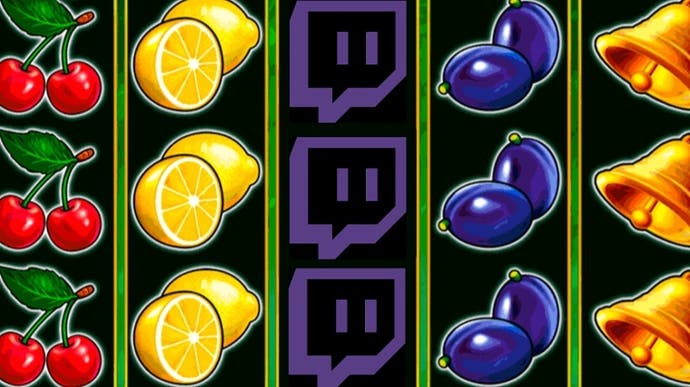Twitch's casino section is an insidious mess - and it's right in view of children
A bad influencer.
If you were to glance at the Twitch homepage right now, chances are, you'd spot all the usual suspects. Fortnite, Pokémon Let's Go, League of Legends, maybe even Fallout 76 (for now).
But among these well-known names, one category stands out. Under an image that looks like the love child of Twitch chat and 4chan, you'll find a variety of gambling streams under the catch-all term "casino". On Sunday night this category had 77,029 viewers - placing it above hugely popular games Red Dead Redemption 2 and Call of Duty: Black Ops 4. According to Twitch Tracker, last month the category had 153 channels broadcasting gambling games at its peak.
The numbers are remarkable, particularly given many of these streams consist of spinning slots with no voice commentary. Why on earth would so many people choose to watch this? How do the streamers afford to do this all day? And, as some people have begun to ask recently, why is this category placed right next to games popular with children, such as Fortnite? And why is nothing in place to prevent children from watching?
Looking for answers, I took a dive into the world of Twitch casino streaming, and found a more problematic section than I could have possibly imagined. Not only do many of the streams promote unlicensed gambling sites and irresponsible betting, but Twitch seems be doing very little to protect children from viewing them. It's possible to access gambling sites from Twitch with absolutely no age gates, with some frequently-advertised sites even taking users to the point of asking for financial details without a single age warning. In the context of a recent Gambling Commission Report which found child gambling has quadrupled in the UK over the past two years, now seems like a good time to spotlight this issue.
I contacted Twitch several times in the course of writing this article. At the time of publishing, the company is yet to respond.
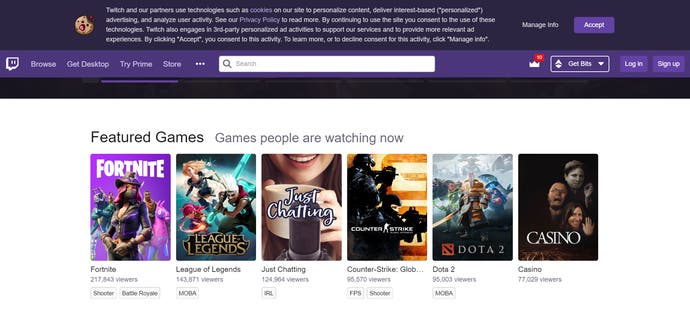
If you haven't ventured into the casino section of Twitch, you may be wondering what all the fuss is about. Although from the name you might expect to see poker or blackjack, these streams tend to be few and far between. The king of the casino section is the slot machine, with most of the really popular streams showing this type of game. Streamers (mostly) use real money to bet on these, and in some cases bet around €50 per spin. While some of the broadcasts are in Russian or German, many are in English, and others have no commentary at all - including a bizarre cryptocurrency gambling stream with a dancing doge. Nearly all of them advertise online casinos, both by streaming games from the casino sites and by placing joining bonus adverts beneath the streams.
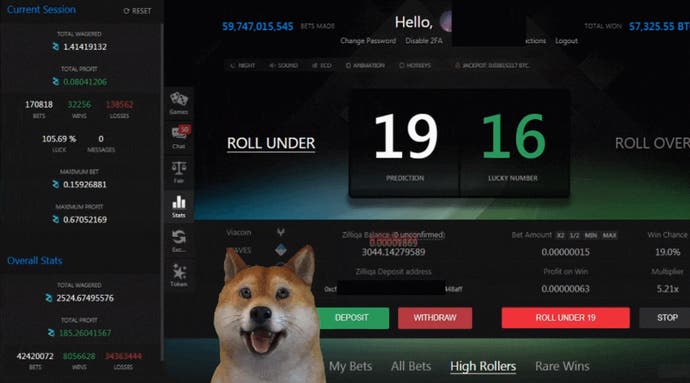
What's particularly concerning about the casino category is its visibility to children. Although content creators can mark their streams as for "mature audiences", only a handful of streamers actually do this, and even then the adverts linking to online casinos remain uncensored. The links shared in video descriptions and via chat bots often lead to pretty dubious sites, and although some are not accessible from the UK, it's still possible to access many of the casinos. As I reported yesterday, the Gambling Commission has confirmed at least two of these are completely unlicensed - which is a requirement for online casinos to operate in the UK.
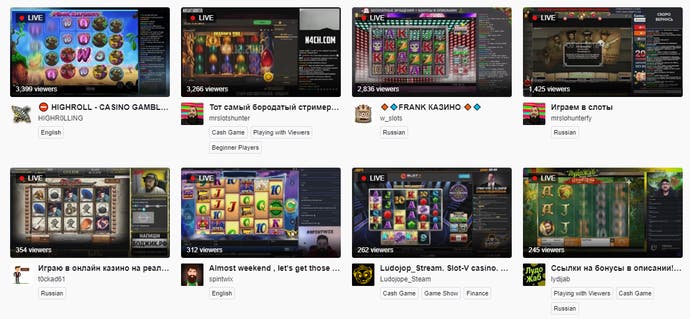
To demonstrate this issue, I recorded the process of moving from Twitch to a site called Frank Casino. Although I knew where to click, the entire journey from Twitch's home page to the point where I was asked for financial details took me about 45 seconds. All I needed was an email address and a password, and there were no age warnings - either from Twitch or Frank Casino. Frank Casino admits in its own terms and conditions that the site is not allowed in the UK, yet it also allowed me to create an account under "United Kingdom". The Gambling Commission confirmed to me this site does not have a licence.
Another of the frequently-advertised sites which concerned me was Luckygames, a cryptocurrency gambling site where players can bet virtual currencies such as Bitcoin, Ethereum and Dogecoin (hence the dancing Shibe stream). Players can create an account with just a username, and upon joining are even given free "Lucky Tokens" with which to test the gambling mechanics (although this currency can't be withdrawn - it's essentially a way to give players a taste for gambling). It's then possible to deposit real cryptocurrencies to bet on a higher-or-lower dice game. As of yesterday, at least four channels were actively streaming Luckygames, while several others included advertisements for the site in their stream descriptions.
Despite the UK Gambling Commission stipulating cryptocurrency gambling sites require a licence, I found Luckygames did not appear to have one. When I contacted Luckygames to ask, I was pointed to its terms of service (where again, there is no mention of a licence), and then recommended to use their "official mirror site" if I couldn't access their regular site "due to restrictions in [my] country". Unsurprisingly, when I checked with the Gambling Commission, this site was also found not to have a licence.
Cryptocurrency gambling is of particular concern, as the virtual currencies are notoriously difficult to trace and lack the sort of security provided by banks. I asked Luckygames what guarantees it gives players that their cryptocurrency is safe. "We are online for 2 years [sic], we have more than 2000 users online simultaneously, more than 3 million monthly access," Luckygames support told me. "I believe this is more than enough to prove that we work seriously and honestly."
All this, of course, while there are no age gates from either Twitch or Luckygames. And if you needed further evidence of the shadiness of the sites, another frequently-advertised casino on Twitch (Videoslots) was last week fined £1m by the UK Gambling Commission for failing to carry out checks into the source of player funds.
The Gambling Commission told me it is "currently working with Twitch to prevent unlicensed sites from being advertised on the platform".
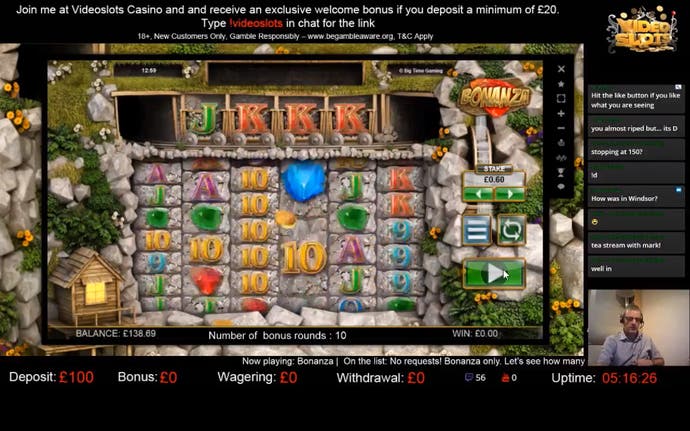
Beyond the links to unlicensed online casinos, something else that concerned me was the highly interactive nature of some of the streams. Roshtein, one of the most popular gambling streamers, uses a third-party website called Stream Elements to reward his viewers for watching his streams. Users can log into the site using their Twitch account to earn one point for every 10 minutes of viewing, and Roshtein's "big wins" (of over 100 times his bet) nets viewers 5 points. These can eventually be spent in Roshtein's store on exclusive casino sign-up deals, although like many of the joining deals advertised on Twitch, these don't really give users much for their money.
One deal from Trada Casino, for instance, offers players a 100 per cent bonus on their first deposit. The catch is there's a wager requirement of x50, which means players have to bet 50 times their deposit amount in order to withdraw any of the funds from that bonus. On that particular sign-up deal, there's a minimum deposit of €50, meaning players have to gamble at least €2500 before the bonus funds can be withdrawn.
They're obviously not good deals, but judging from the ever-present demands of "open" in Roshtein's stream chat (to get him to hand out points), the interactivity of the points and store system certainly seems to encourage viewers to keep watching and claiming the bonuses.

To get an insider perspective on the category as a whole, and ask about some of these issues, I contacted several casino streamers with some questions on the topic. Perhaps unsurprisingly, most were reluctant to speak to me for this article. Thankfully, one of the three brothers who runs popular channel CasinoDaddy, Mathias Joelsson, agreed to talk to me.
Joelsson explained part of the reason for the casino category's growth may well be due to "view bot streams" artificially inflating the numbers. According to Joelsson, streamers use these in order to gain human viewers "because people go to the section and go to the one with the most viewers".
This would certainly explain the huge numbers watching the streams. It also correlates with observations made in a recent report by Kotaku on the subject. As observed by writer Nathan Grayson, many of the streams show tell-tale signs of chat bots, while many casino streaming channels amass thousands of viewers in a single day - before mysteriously being banned. I myself saw one channel disappear and reappear three times in this way. It makes sense, as channels hoping to advertise casinos can push themselves to the top of the category, and if they do get banned by Twitch, they can simply create another channel and do it again. If enough people do this, the whole casino category ends up being visible on the Twitch featured games list.
Yet Joelsson told me of a number of other problems. He claimed some casino channels steal content from other streamers' broadcasts, which they then re-stream on their own channels. More worryingly, Joelsson says many streamers use play funds "so they can sit and attract viewers with higher bets". By play funds, Joelsson means money given to the streamers by casinos that can't be withdrawn from the site, but can be used to play the games on stream. "It's kind of a scam," Joelsson added. "They make the viewers believe it is real, and we had a lot of offers from many casinos with offers for us to play with play funds."
Joelsson was eager to emphasise, however, that CasinoDaddy does not accept these offers, and the channel tries to remain transparent by displaying their deposits and withdrawals.
As Joelsson insisted CasinoDaddy uses real money, I was curious to find out how the financial aspect of gambling streaming works. In other words, how can they afford it? The answer, according to what Joelsson said, is special deposit bonuses from the casinos.
"The casinos want us to play on their sites, so they offer us good deposit bonuses," Joelsson explained. "On every deposit, we get a deposit bonus, and it varies from 100 per cent up to maybe 200 per cent bonus. So if you deposit 300, we get either 300 or 600 in bonus. Otherwise we couldn't really do it, we'd have to have a much lower stake per spin if we didn't have the bonuses."
In addition to this, CasinoDaddy accepts affiliate deals from a number of "legit" casinos, which pay the channel based on the number of people who take the joining deals advertised on their channel. "We do some research before we take them on, then it differs from brand to brand whether you get paid by normal revenue share, or a hybrid deal: which means you get a fixed fee and then a percentage," Joelsson told me. "We try to mostly take the fixed fees, because we want to get happy when the viewers win, otherwise it's only based on the player's losses if you have a normal revenue share."
Enough people seem to be watching CasinoDaddy for the channel to have become a part-time job for the brothers, who run an IT company alongside streaming. "Now the IT is more like a side business," Joelsson mused.
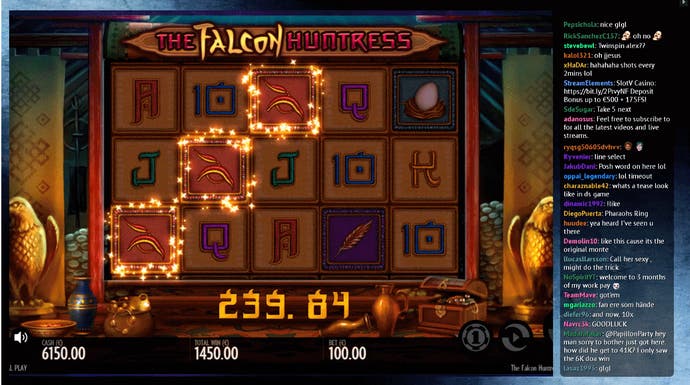
Despite profiting from the casino section, I was somewhat surprised to hear Joelsson say he believes Twitch needs to take a closer look at the game category.
"I think they should put some more time into viewbotters and those who use play funds, because it's not fair and it's false advertising," Joelsson said. "People can go and think they can bet €1500 per spin, and people can get into really big trouble if you don't promote responsible gambling."
According to Joelsson, Twitch does not currently have any policies directly dealing with casino streaming: apparently the standard community guidelines are all you get, and although they deal with nudity, violence and illegal activities, there are no guidelines on gambling. When I asked if he thought age warnings on gambling streams should be compulsory, he agreed it "should be default under the game section".
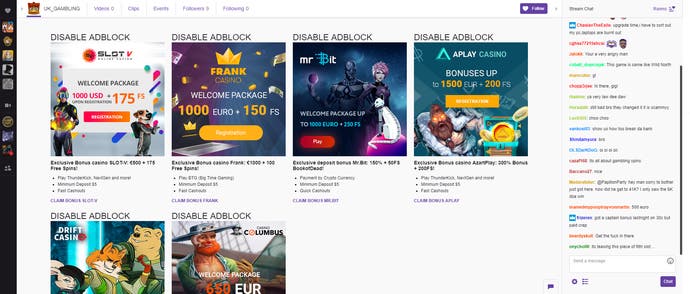
As part of this investigation, I contacted multiple regulatory bodies and organisations to ask what they made of the issues raised in this article. I had a rather difficult time of it, however, as most had not heard of Twitch. Generally speaking, gambling organisations are increasingly concerned about the ties between the world of gaming and gambling. The UK Gambling Commission, for instance, explained it has recently "been highlighting the growth in examples where the lines between gambling, social gaming and video games are becoming increasingly blurred". The Commission also pointed to its recent joint declaration with 17 international gambling regulators, stating it is "aware of the increasing risks posed to children and young people and will work together to tackle this".
Anne Longfield, Children's Commissioner for England, also said she was concerned about the "worrying blurring of the lines between straight forward games and the so called 'gamification' of gambling".
"Too many children have a regular and in some cases serious problem with gambling and recognising that fact should be the very justification for platforms to act," she added.
This is a position shared by GambleAware - a leading British charity focused on reducing gambling-related harms. Marc Etches, Chief Executive of GambleAware, gave Eurogamer the following statement:
"Gambling is an adult activity, so for children to be able to play and access gambling activity in this way ought to be a serious concern for all of us. This situation is a good example of how children are growing up in a very different world to the one their parents and grandparents grew up in. Children are increasingly exposed to gambling and gambling-like activity, particularly online, which is normalising a risky adult activity. We all share the responsibility to protect children and other vulnerable people from the harms that arise from gambling, including all those involved in the video gaming world."
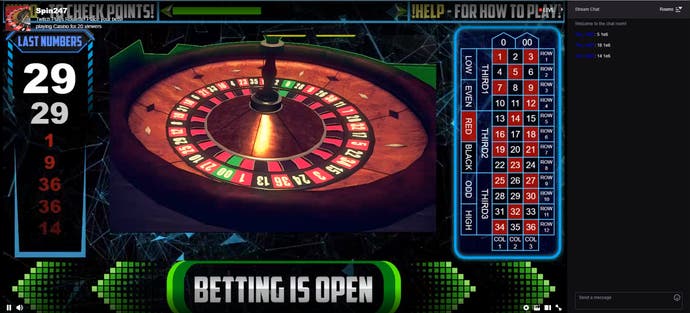
Aside from streaming unlicensed sites (which come under Twitch's "illegal" section of the community guidelines), the regulation of casino advertising on Twitch to protect children seems a little murky. In the UK, this is governed by the Advertising Standards Authority, who explained to me "where Twitch is serving ads to account holders, our rules require advertisers to use the tools available to stop the targeting of gambling products at children". On the subject of the gambling streams themselves, the ASA said it would "have to assess the content and context to determine what would fall within remit". But this raises the question of whether Twitch can be said to be actively "targeting" children so much as failing to prevent the ever-increasing visibility of gambling streams.
It sounds like Twitch isn't currently bound by regulations to take action to make the streams less visible to children, but in a moral sense it probably should. But what sort of action should it take? As previously mentioned, enforcing a compulsory age warning on the entire category would be a start, but Twitch could also require users to create an account before accessing the casino streams. Removing the category from the featured games section on the home page would also reduce its visibility, while if those allegations of view-bots are true, Twitch could significantly reduce the casino's perceived popularity by removing fake viewers. Now the Gambling Commission has asked Twitch to remove adverts for unlicensed casino sites, the platform will have to keep closer tabs on the permitted content in the casino section. But as a policy change and enforcement would require curation, Twitch may well choose to region-block the entire casino category for the UK - something it has previously done for a Crunchyroll marathon due to licensing issues. Although this, of course, would require blocking an entire category rather than one channel.
Regardless of the type of action Twitch should choose to take, it should at least seriously consider many of the issues with gambling streams. Due to continued neglect, the casino section has become a wild west of problematic advertising, and it would only take a couple of simple changes to at least hide this from children. If nothing is done, the casino section will continue to function as a gateway to some of the shadiest parts of the internet: although with the Gambling Commission now watching, I wonder if Twitch will be able to get away with this for much longer.
